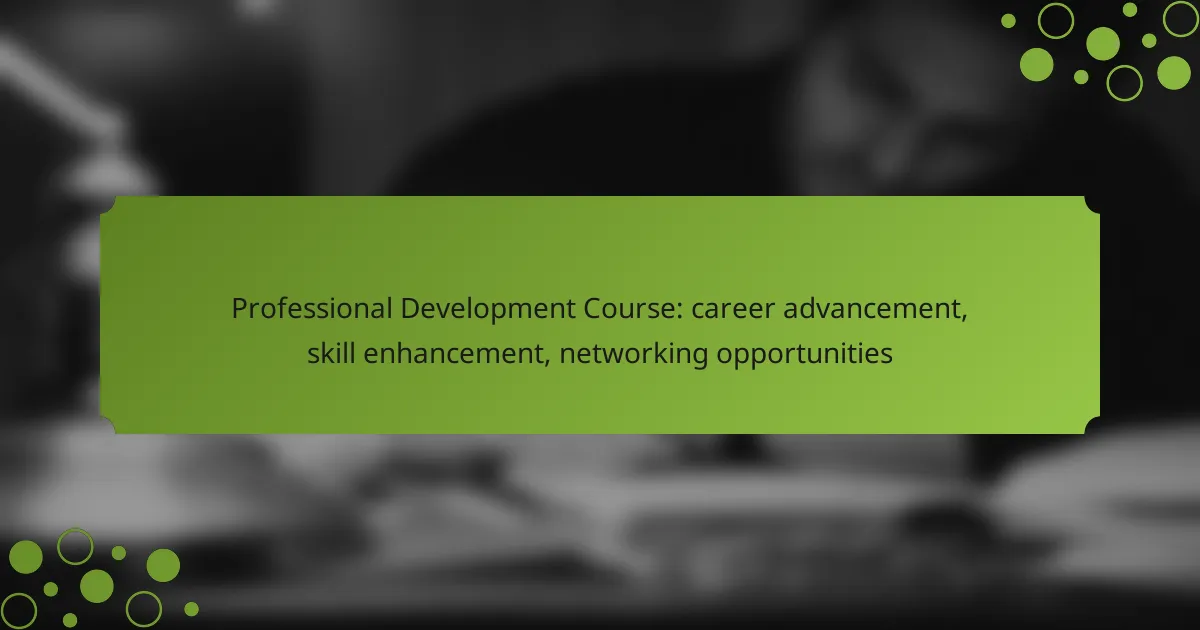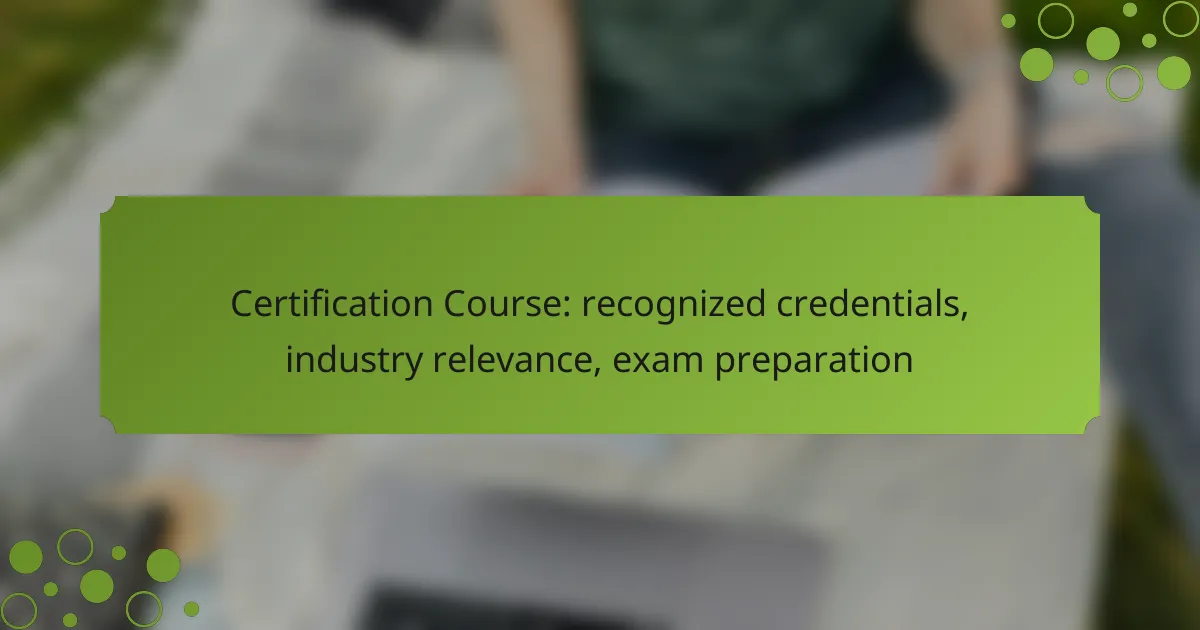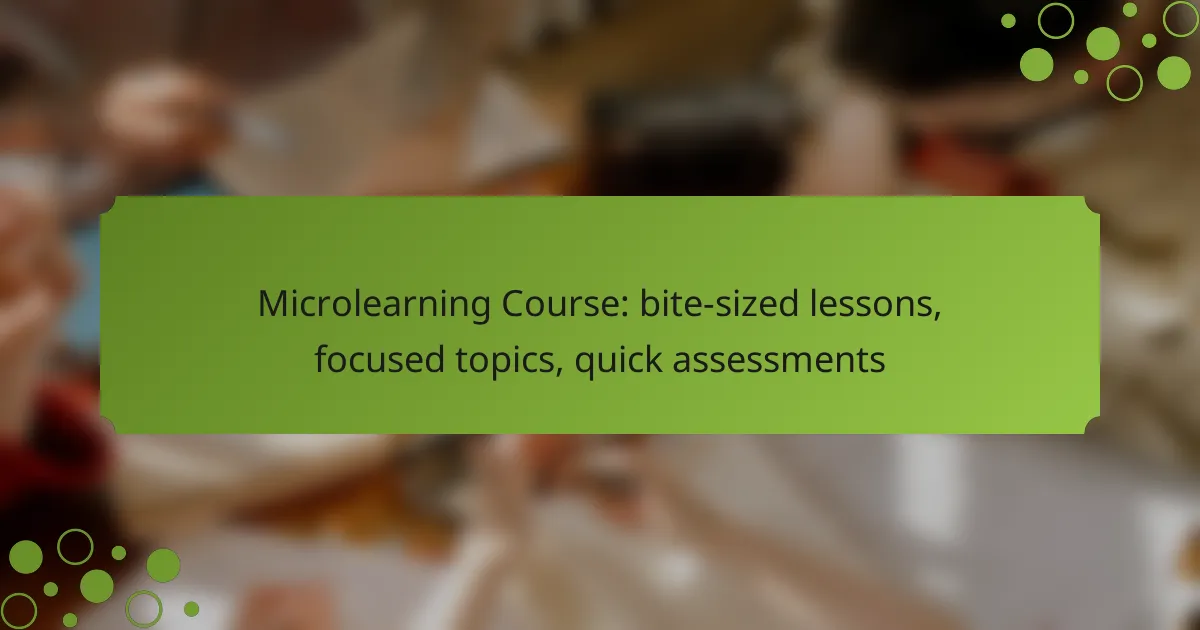Professional development courses are vital for career advancement, providing essential skills and recognized certifications that enhance your employability. They also offer valuable networking opportunities, connecting you with industry professionals and peers, which can lead to new job prospects and collaborations. By participating in these courses, you can stay competitive in a rapidly changing job market and position yourself for future success.

How can professional development courses enhance career advancement in Canada?
Professional development courses can significantly boost career advancement in Canada by equipping individuals with essential skills, recognized certifications, and valuable networking opportunities. These courses help professionals stay competitive in a rapidly evolving job market, making them more attractive candidates for promotions and new roles.
Skill acquisition for job promotions
Acquiring new skills through professional development courses is crucial for securing job promotions. Courses often focus on in-demand skills such as project management, data analysis, or leadership, which can directly impact an employee’s ability to take on higher responsibilities.
For example, a course in advanced Excel or programming can make a candidate stand out when applying for a managerial position. Investing time in skill enhancement can lead to increased job performance and higher chances of promotion.
Certification for industry recognition
Obtaining certifications through professional development courses can enhance an individual’s credibility and recognition within their industry. Certifications demonstrate a commitment to continuous learning and mastery of specific competencies, which employers often value.
In Canada, certifications from recognized bodies, such as the Project Management Institute (PMI) or the Canadian Institute of Management (CIM), can significantly improve job prospects and salary potential. Having these credentials can set candidates apart in competitive job markets.
Access to mentorship programs
Many professional development courses offer access to mentorship programs, which can be instrumental in career growth. Mentorship provides guidance, support, and insights from experienced professionals, helping individuals navigate their career paths more effectively.
Participating in a mentorship program can lead to valuable connections and opportunities that may not be available otherwise. Building relationships with mentors can also enhance one’s professional network, opening doors to new job opportunities and collaborations.

What skills can be enhanced through online courses?
Online courses can enhance a variety of skills essential for career advancement, including leadership, technical expertise, and soft skills. These courses provide flexible learning opportunities that cater to diverse professional needs and goals.
Leadership and management skills
Leadership and management skills are crucial for those looking to advance in their careers. Online courses often cover topics such as team dynamics, strategic planning, and conflict resolution, enabling learners to effectively lead teams and projects.
Consider enrolling in courses that offer practical case studies and real-world scenarios. This approach helps in applying theoretical knowledge to actual workplace challenges, enhancing your ability to manage effectively.
Technical skills in specific industries
Technical skills vary widely across industries and are essential for staying competitive in the job market. Online courses can provide training in areas such as data analysis, software development, and digital marketing, tailored to specific industry needs.
When selecting a course, look for those that offer certifications recognized in your field. Certifications can significantly enhance your resume and demonstrate your commitment to professional growth.
Soft skills like communication
Soft skills, particularly communication, are vital for successful collaboration and relationship-building in any profession. Online courses can help improve verbal and written communication, active listening, and emotional intelligence.
To maximize learning, practice these skills in real-life situations. Engage in group discussions, seek feedback on your communication style, and apply techniques learned in courses to everyday interactions.

What networking opportunities do professional development courses provide?
Professional development courses offer valuable networking opportunities that can significantly enhance your career. These courses connect you with industry professionals, alumni, and peers, facilitating relationships that can lead to job opportunities and collaborations.
Connections with industry professionals
Engaging with industry professionals during professional development courses allows you to build relationships that may lead to mentorship or job referrals. Instructors and guest speakers often have extensive networks and can provide insights into industry trends and opportunities.
To maximize these connections, actively participate in discussions and reach out to speakers after sessions. Consider scheduling informational interviews to learn more about their career paths and seek advice tailored to your goals.
Access to alumni networks
Many professional development courses offer access to alumni networks, which can be a powerful resource for career advancement. Alumni often share job openings, industry news, and valuable insights that can help you navigate your career more effectively.
Engage with alumni through networking events or online platforms. Building relationships with alumni can lead to mentorship opportunities and provide a support system as you progress in your career.
Participation in workshops and seminars
Workshops and seminars included in professional development courses provide hands-on learning experiences and opportunities to network with fellow participants. These settings encourage collaboration and knowledge sharing, which can lead to lasting professional relationships.
When attending these events, be proactive in introducing yourself and exchanging contact information with others. Follow up after the event to maintain the connections you’ve made, as this can open doors to future collaborations or job opportunities.

What are the prerequisites for enrolling in these courses?
To enroll in professional development courses, candidates typically need to meet certain prerequisites that may include educational qualifications, relevant work experience, and technical requirements for online learning. Understanding these criteria can help streamline the enrollment process and ensure a successful learning experience.
Basic educational qualifications
Most professional development courses require participants to have at least a high school diploma or equivalent. Some advanced courses may necessitate a bachelor’s degree or specific certifications relevant to the field of study.
It’s advisable to review the course descriptions carefully, as they often specify the minimum educational background needed. For example, courses in specialized fields like data science may require foundational knowledge in mathematics or statistics.
Relevant work experience
Many courses prefer or require candidates to have some level of work experience in a related field. This experience helps participants engage more deeply with the course material and apply what they learn in practical settings.
For instance, a course focused on project management may expect applicants to have prior experience in managing projects or teams. If you’re transitioning to a new field, consider highlighting transferable skills from your previous roles.
Technical requirements for online learning
For online courses, participants need reliable internet access and a computer that meets specific technical standards. This typically includes a modern web browser, a webcam, and audio capabilities for virtual interactions.
Before enrolling, check the course’s technical requirements to ensure your equipment is compatible. Some platforms may also recommend specific software or applications that enhance the learning experience.

How to choose the right professional development course?
Choosing the right professional development course involves evaluating your career goals, the skills you wish to enhance, and the networking opportunities available. Focus on courses that align with your objectives and provide tangible outcomes.
Assessing course content and outcomes
When assessing course content, review the syllabus to ensure it covers relevant topics that align with your career aspirations. Look for courses that offer practical applications, case studies, or projects that can enhance your skill set.
Outcomes should be clearly defined. Seek courses that provide certifications or credentials recognized in your industry, as these can significantly boost your employability and career advancement.
Evaluating instructor qualifications
Instructor qualifications are crucial for a valuable learning experience. Check their professional background, industry experience, and educational credentials to ensure they are experts in the subject matter.
Consider reading reviews or testimonials from past students to gauge the instructor’s effectiveness and teaching style. A knowledgeable instructor can greatly enhance your understanding and engagement with the course material.
Considering course format and flexibility
The format of the course can impact your learning experience. Determine whether you prefer in-person classes, online courses, or a hybrid model. Each format has its benefits, such as networking opportunities in person or the convenience of online learning.
Flexibility is also essential, especially if you have a busy schedule. Look for courses that offer asynchronous options or varied class times to accommodate your commitments. This can help you balance professional development with work and personal life effectively.

What are the costs associated with professional development courses?
The costs of professional development courses can vary widely based on factors such as the type of course, duration, and provider. Typically, individuals may encounter tuition fees, materials costs, and sometimes travel expenses if the course is in-person.
Tuition Fees
Tuition fees for professional development courses can range from a few hundred to several thousand dollars. Online courses tend to be more affordable, often falling between $200 and $1,500, while in-person workshops or certification programs may cost upwards of $2,000. Consider your budget and the potential return on investment when selecting a course.
Materials and Supplies
In addition to tuition, you may need to budget for materials and supplies, which can include textbooks, software, or other resources. These costs can add another $50 to $500, depending on the course requirements. Always check the course syllabus or ask the provider for a detailed list of expected expenses.
Travel and Accommodation
If the course is held in a different city or country, travel and accommodation costs can significantly increase your total expenditure. Flights, hotels, and meals can add hundreds to thousands of dollars to your overall investment. Look for local options or online alternatives to minimize these costs.
Opportunity Costs
Consider the opportunity costs associated with taking a professional development course. Time spent in class or studying is time not spent on work or other commitments. Weigh the potential benefits of skill enhancement and networking against the income you might forgo during this period.



